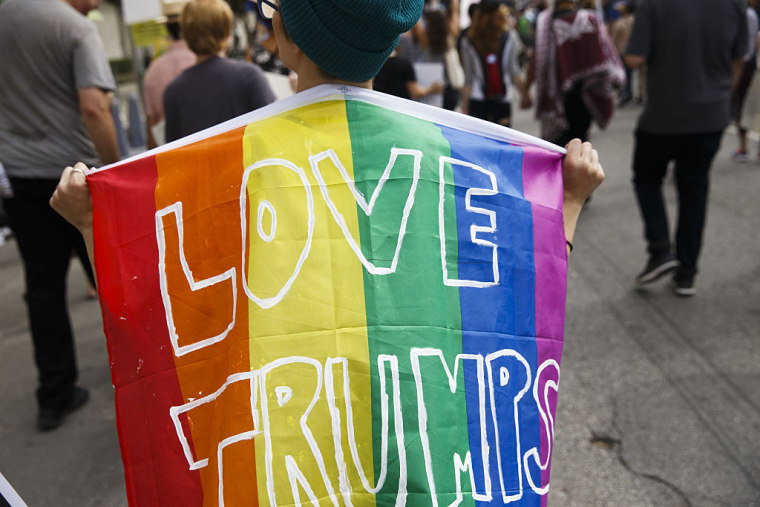Billy Mawhiney is a 38-year-old cooking instructor in Sioux Falls, South Dakota. He works with local kids, teaching classes at Plum’s Cooking Company, which he describes as a local version of Williams-Sonoma.
Mawhiney and his husband, Kyle Margheim, have been together for ten years but married for five. Margheim also works with kids, teaching them to swim at a local club that contracts with the school district.
Three years ago, the couple decided they were ready for children of their own.
The process for becoming foster parents was rigorous. Mawhiney recalled "Two months of classes, FBI background check, fingerprinting, home visits, physicals, safety checks" and more.
In the end, it was worth it: they became foster parents to two children, both under the age of 2. One of the kids currently lives with them, but the couple can’t give their name or age to a reporter due to the strict privacy laws protecting foster kids.
And this July, that child could potentially be taken away from the home, and Mawhiney and Margheim’s lives as parents would change forever.
That's because South Dakota just passed the first anti-LGBT law of 2017, a bill that takes effect in July and allows adoption and foster agencies that receive state funding to turn away families like Mawhiney’s if the agency cites religious objections to LGBT people.
In Mawhiney’s case, that means that a foster child might not get access to a loving pair of parents who have spent most of their careers working with kids. It also means they may never be able to permanently adopt the child currently in their care.
"I’m a Christian and I believe in freedom of religion," said Mawhiney. "But it should not be used to deny kids homes, to deny vulnerable children loving parents."
While South Dakota’s is the first passed, over 100 bills have been proposed this year that aim to curb the civil rights of LGBT Americans. Dozens of those target children and families primarily.
Four states are considering bills that would allow adoption and foster care agencies to opt out of anything that has to do with LGBT people. Fifteen states have so-called “bathroom bills” on the table, which would prevent transgender kids and teens from being able to access gender-appropriate restrooms, locker rooms, and other sex-segregated facilities at school.
The federal government had promised to protect transgender students last year, but the Trump administration pulled back from defending Title IX protections for transgender kids on February 22nd, leaving an opening for such legislation to pass without federal interference.
In Texas alone, over a dozen pieces of pending legislation target the LGBT community. There are bills that propose allowing student clubs to discriminate and still receive school funds, bills that allow county clerks to opt out of issuing marriage licenses to couples, bills that deny adoption and foster care to same-sex couples, and bills that make it legal for florists and bakers to refuse supplying a gay wedding.
Other bills target access to healthcare — for example, a Texas bill that would allow a school guidance counselor to refuse help to a child who is LGBT or has gay parents.
In a press call Monday, the ACLU’s Eunice Rho said the majority of the legislation hinges on the idea that a person’s religion allows them to discriminate against certain classes of people.
“We’re seeing different tactics trying to undermine the rights of LGBT people,” said Rho. “These religious objection bills are the newest trend.”
Sarah Warbelow, Legal Director at the Human Rights Campaign, said “Many of these bills have a serious chance of moving forward this year.”
Some bills go even further than simply using religion as a guise for circumventing civil rights: At least seven pieces of legislation aim to prevent local cities and towns from passing their own non-discrimination laws. The largest number of bills, says Warbelow, directly target transgender children, teens, and adults.
But it’s the adoption legislation in Alabama, Oklahoma, South Dakota, and Texas that is currently cause for concern among child welfare advocates.
Christine James-Brown of the Child Welfare League of America on Monday noted that her organization, a coalition of hundreds of public and private agencies serving children and families, issues standards of care and best practices that oppose discrimination against LGBT parents, whether in foster care or permanent adoption.
“The main resource for children up for adoption is the family that is currently fostering them,” said Brown, echoing concerns about Mawhiney’s foster child. “Any type of law that restricts the availability of children to good parents is of concern.”
But Mawhiney still has hope. Not every child welfare agency worker will try to use faith as an excuse to turn his family away, especially in the midst of an adoption crisis.
“Not every family looks the same, but we all have one thing in common: we put the needs of our kids first,” Mawhiney said. "The people making the laws of South Dakota should do the same."
